Matt Rees's Blog - Posts Tagged "hitler"
The right Holy Land, the wrong Holy Father
My irreverent take on the arrival of Pope Benedict XVI to the Holy Land features prominently on The Daily Beast today. Maybe people always say their take is "irreverent," but in the case of a story about the Pope I feel justified in using it...
From Hitler History to Mahler Mystery: J. Sydney Jones’s Writing Life
 Some authors exude the pleasure of reading and writing (and, believe me, when you meet them, you’d be surprised how many just don’t.) J. Sydney Jones is such a writer, with a breadth of writing experience in an array of genres that’s highly impressive and carries with it an obvious love of his craft. His Viennese Mystery series is a fascinating way to delve into one of Europe’s loveliest, most cultured cities – and damned entertaining, too. He’s also the man behind a great new blog Scene of the Crime, which focuses on the role of place in crime fiction – check out Syd’s interview with Berlin noirmeister Philip Kerr. Here Syd discusses his career and his ideas about writing.
Some authors exude the pleasure of reading and writing (and, believe me, when you meet them, you’d be surprised how many just don’t.) J. Sydney Jones is such a writer, with a breadth of writing experience in an array of genres that’s highly impressive and carries with it an obvious love of his craft. His Viennese Mystery series is a fascinating way to delve into one of Europe’s loveliest, most cultured cities – and damned entertaining, too. He’s also the man behind a great new blog Scene of the Crime, which focuses on the role of place in crime fiction – check out Syd’s interview with Berlin noirmeister Philip Kerr. Here Syd discusses his career and his ideas about writing.How long did it take you to get published?
I started out in journalism, so I had a sense of accomplishment right off, publishing my travel pieces in newspapers and magazines all over the place. Books are a different animal, but again I went with travel first and had some good early success with walking, hiking, and cycling guides. I wrote eight novels, though, before I got my first one, Time of the Wolf, published.
With the current “Viennese Mystery” series, things were easier. I had a bit of an author platform with several well-received books about Vienna and an agent who is most savvy. First query landed us the book deal.
Would you recommend any books on writing?
Tried and trusted here: you can look a lot further and do a lot worse than E.M Forster’s Aspects of the Novel. Another classic is Percy Lubbock’s The Craft of Fiction. These will not be everyone’s cup of tea, but I just love the erudite discussions in both.
What’s a typical writing day?
I get to work about nine in the morning after I drop my son off at school. I try to devote the first hours of the writing day to the current fiction project--currently the fourth book in the Viennese Mystery series. Then some exercise--tennis, if I am lucky--and lunch, followed by more mundane freelance stuff in the afternoon that also helps to pay the bills.
Plug your latest book. What’s it about? Why’s it so great?
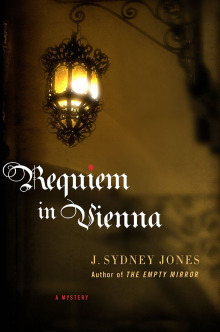
Each of the books in the Viennese Mystery series features a famous historical figure of Vienna 1900. Requiem in Vienna focuses on musical Vienna: the composer Gustav Mahler is the target of an assassin and my protagonist, the lawyer and private inquiries man, Karl Werthen, is hired to protect him. The books are a blend of historical whodunit and literary thriller with more than a dash of historical/cultural/food lore thrown in.
Here’s what a Kirkus Reviews critic had to say of the current series installment: “Sophisticated entertainment of a very high caliber.”
How much research is involved in each of your books?
There are decades of research in the books. Explanation: I started researching Vienna 1900 long ago for my book, Hitler in Vienna. Since then I have continued to read heavily in the period, but for each book I still need to bone up on the historical folks I am featuring. Some writer once said that research was sort of like writing without the creative sweat. I enjoy the research; I probably commit about three months to each before I even begin the plotting. And thank whomever for the Internet--I can even get full editions of Viennese papers of the time online.
Where’d you get the idea for your main character?
Karl Werthen is a successful lawyer and sometimes inquiry agent, an assimilated Jew, and a distinct Viennophile. And I haven’t got a clue to where he comes from, other than a shared love for Vienna. He just appeared full-formed on the first page of The Empty Mirror, the initial in the series. A minor character, he elbowed his way to the forefront by the end of the first draft; the series concept actually had the real-life father of criminology, Hanns Gross, as the protagonist. A crusty old curmudgeon, Gross tugs Werthen away from his safe wills and trusts gig back into criminal law in that first one, to prove the artist Gustav Klimt innocent of murdering his model. But it just worked out so much better to use Werthen as my lead and Gross, the pompous pro, as the sometimes sidekick.
What’s your experience with being translated?
Somewhat odd. For example, my Hitler in Vienna was first published in Germany. I originally queried publishers there in German, and it was bought sight unseen (Hitler, at the time, was a hot topic). When they received my doorstopper of a manuscript in English and realized it needed to be translated, they were none too pleased. But they sucked it up and published anyway.
Then when trying to sell the English-language rights, I had a hell of a time convincing editors in England and the U.S. that no, they would not have to have the book translated. I already had the English original of the manuscript.
What books have influenced you?
As a young man I loved the lyricism of Steinbeck. Lee from East of Eden is still one of my favorite fictional characters. And of course there was Hemingway and Fitzgerald. Then during the almost twenty years I lived in Vienna, I became an avid reader of nineteenth- and twentieth-century British authors. Blame it on the British Council. A wonderful resource in its day with massive armchairs around a humming ceramic stove. Thomas Hardy became my literary hero; I open one of his novels and begin reading his scene-setting on some desolate heath in the south of England, and I get actual chills. The language just works for me. And Conrad. Don’t even get me started on Conrad--and the bugger wrote in a second language! A guilty pleasure also became the works of J.B. Priestley, especially his Good Companions.
Did these books influence my writing? Who knows, but they surely have made my life fuller. Le Carre, of course, pushed me in new ways with dialogue and plot, as did the early fiction works of Paul Theroux (Saint Jack, Picture Palace). I wish I could make my dialogue sparkle and crack they way those guys do. But this catalogue could go on for some time. Basta.
Thanks, Syd. Fascinating insights.
Thanks for the opportunity to chat, Matt.
Published on February 18, 2010 02:11
•
Tags:
aspects-of-the-novel, austria, berlin, berlin-noir, crime-fiction, e-m-forster, exotic-fiction, fitzgerald, gustav-mahler, hemingway, hitler, interviews, j-sydney-jones, john-le-carre, joseph-conrad, karl-werthen, matt-beynon-rees, paul-theroux, percy-lubbock, philip-kerr, requiem-in-vienna, scene-of-the-crime, steinbeck, the-craft-of-fiction, vienna, writing-life
Cheers for Hitler, and Brits go home
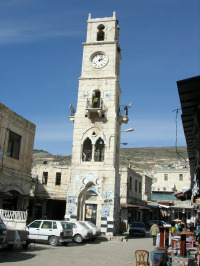 The company you keep can put the culture around you in a new light, let you see it as you haven’t before.
The company you keep can put the culture around you in a new light, let you see it as you haven’t before.That’s true when I travel to different countries and discover that readers in Germany have a particular take on my Palestinian crime novels which differs from the way they look to Americans, for example.
I got to thinking about this when I was wandering the Nablus casbah this week with two German friends. An enthusiastic Palestinian fellow asked me to explain to them how much he appreciated Hitler, and as an afterthought he noted that all his people’s problems are caused by me and my compatriots from the British Isles.
I had just climbed up the old Turkish clocktower in Manara Square at the heart of the casbah with one of the Germans. I’d never seen the door at the bottom open before, but there was a policeman inside on this occasion and he generously allowed us to go up the ladder. On the first balcony, I stepped through more pigeon feces than I’d have thought could possibly gather in one place. It was crusty for an inch or two, then a little slushy beneath. I had a grin all over my face of the kind that tends to appear there when I discover a new corner in a place I’ve often been – and loved being there – before.
Read the rest of this post on my blog The Man of Twists and Turns.
Published on June 17, 2010 01:33
•
Tags:
barry-unsworth, bedouin, berlin, crime-fiction, damascus, dehaisha-refugee-camp, george-w-bush, germany, hamas, hitler, imperial-camel-corps, jerusalem, middle-east, nablus, omar-yussef, ottomans, palestine, palestinians, the-rage-of-the-vulture, the-samaritan-s-secret, tony-blair, turkey, wales
Memo to Oliver Stone
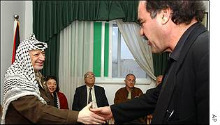 In Israel, the Jews control the banks! They fill all the top positions in the media! They are behind all the major political powerbrokers! They even print the money!
In Israel, the Jews control the banks! They fill all the top positions in the media! They are behind all the major political powerbrokers! They even print the money!Someone should look into this, Oliver, because I don’t think it’s just coincidence, and I know you’ll agree. I think you’re the man to expose it.
You said in an interview published this weekend that Hitler was “a Frankenstein,” and then went on to add that the Dr. Frankenstein who created him was an amalgam of U.S., British and German industrialists. You added that the Nazis killed more Russians than Jews and opined that, in spite of this, we tend to think of the Holocaust as a Jewish thing. (You said something else about having “walked in Hitler’s shoes…” but let’s just put that aside for now.)
On the one hand, Oliver, you’re an oaf who has had to apologize for his “clumsy association” about the Holocaust. Well, the art world needs oafs from time to time. Because on the other hand, Oliver, we all ought to remember that reality is much more sophisticated than the explanations of history which are handed down to us, honed and narrowed until they read very simplistically, ignoring inconvenient facts and allowing people to shout down those who point out such facts.
Read the rest of this post on my blog The Man of Twists and Turns.
Published on July 29, 2010 01:26
•
Tags:
benny-morris, frankenstein, glamorgan, hitler, holocaust, israel, jews, nazis, oliver-stone, palestinians, russians, the-doors, wales, yasser-arafat, zeev-sternhell
Bielefeld does exist!
 On my book tours I often venture to places few others visit. There are book festivals in tiny provincial towns. Readings at bookshops in small rural villages. This week I spoke in a German town that many Germans are convinced doesn’t even exist.
On my book tours I often venture to places few others visit. There are book festivals in tiny provincial towns. Readings at bookshops in small rural villages. This week I spoke in a German town that many Germans are convinced doesn’t even exist.Bielefeld (population 330,000) is a town in North Rhine-Westphalia. Or is it?
Since the 1990s, there has been a widespread internet campaign to convince Germans that this town doesn’t exist. It began as a light-hearted battle over computer codings between some fellows in Bielefeld and others elsewhere (who took a different view of the coding and decided to fight back.) Even though most of them know it exists (or do they?), Germans often respond to mention of Bielefeld with the words, “Bielefeld doesn’t exist."
This is because the town is rarely visited, doesn’t have a regional accent of its own, isn’t mentioned in the news very often, and had for a long time a railway station that looked boarded up. There are also few monuments or great buildings there, because…well, you can thank the USAAF and the RAF for that. (Bielefeld isn’t far from the Ruhr and was heavily bombed in World War II.)
The city council once released a statement titled “Bielefeld does exist,” but they released it on April Fools Day. So it looked as though the city council even was saying Bielefeld didn’t exist.
But I went there. And it does exist. In fact, it’s quite nice.
Read the rest of this post on my blog The Man of Twists and Turns.
Published on September 02, 2010 01:24
•
Tags:
andreas-schnadwinkel, bad-oeynhausen, bielefeld, book-tours, cologne, germany, hitler, internet, jews, judaism, leni-riefenstahl, rhineland, synagogue, thomas-wolff
Overturning detective fiction: everyone's guilty in my novels
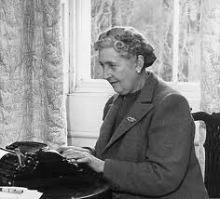 The “Golden Age” of the detective story was the 1920s and 1930s. It was a turbulent period. In Britain, the General Strike. In the U.S., the Depression. Civil war in Spain, and in Germany the rise of the Nazis. Red scares everywhere, fascists too.
The “Golden Age” of the detective story was the 1920s and 1930s. It was a turbulent period. In Britain, the General Strike. In the U.S., the Depression. Civil war in Spain, and in Germany the rise of the Nazis. Red scares everywhere, fascists too.But the detective story was a solace to those who lived in such ugly times. In the model employed by Agatha Christie and Dorothy L. Sayers, the story ended with one criminal fingered by the detective. Everyone else turned out to be innocent. Order was restored. It was as if the writers were saying, Don’t worry about what you read in the newspapers; everything can be fixed and only a small minority are making the trouble.
In my Palestinian crime novels, the opposite is true. Everyone’s guilty. Tat’s the reality I found in Palestinian society, as disaster befell it in the last decade – an intifada, a civil war, and now a horrible stand-off between rival factions. Not any one person’s fault.
I believe that’s a better reflection of the world in which we live. My novels are entertainments, but they aren’t layered with the conservative perspective of the “Golden Age.” I don’t want readers to think that there’s nothing wrong out there, so long as the detective nabs the sole bad guy in the library.
Crime novels today are grittier than the work of Christie. They tend to be closer to the atmosphere of Raymond Chandler, who wrote that the Golden Age stories “really get me down.” But the Chandler ethos of a lone knight facing an utterly corrupt world is largely ignored.
That’s why there are so many novels these days about pedophiles and psychopaths. Such characters are beyond the pale of behavior in which we could imagine ourselves participating. To commit a crime in such novels is to mark oneself out as a deviant. As soon as the deviant is nabbed, the society can go back into its usual calm manner.
I think this is why Scandinavian crime novels have been so popular. Readers like the fact that, while the detective wrestles with the psycho, the society depicted is clearly not so very flawed. As soon as the psycho is nabbed, Sweden will return to its pleasant, polite way of life—something that’s easier to envisage than it would be in a novel set in, say, Bangkok or Gaza. Even in his recent novel, “The Worried Man,” Henning Mankell describes his detective as being no more than “worried about the direction of Swedish society.”
Worried! Can you imagine Omar Yussef, my Palestinian sleuth, being no more than worried? He lives in a society that’s engulfed in disaster. He knows everything’s going to hell and he’s aware that nabbing a single bad guy won’t change that.
The golden age method ought to have been overtaken by reality in a post-Holocaust age. Hannah Arendt wrote of the banality of evil, meaning that people don’t choose good or bad, they just go along. We’d like to see bad guys as pure evil, deciding firmly to commit horrible acts, while the truth of the Holocaust and many other dreadful events is that people are much more likely to operate in a kind of malleable denial.
It’s a vital insight. Yet I find most crime novels are written as though Hitler never happened—as if one wicked man can be blamed for what millions of others simply went along with.
Read the rest of this post on my blog The Man of Twists and Turns.
Published on September 09, 2010 02:19
•
Tags:
agatha-christie, crime-fiction, detective-stories, dorothy-l-sayers, hannah-arendt, henning-mankell, hitler, holocaust, intifada, nordic-crime, omar-yussef, palestine, palestinian, raymond-chandler, the-samaritan-s-secret
Compelling seeds of true history: Philip Sington’s Writing Life interview
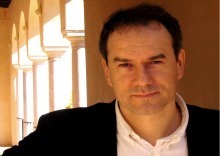 The best historical novels are based on some element of real history which has been either neglected or is little known. Philip Sington’s “The Einstein Girl” grows out of the revelation that Albert Einstein had a secret daughter. Sington takes that seed and, with the hand of a true thriller master, builds around it a story of psychiatry and love in the early days of Hitler’s Germany. It's one of the most beautiful and harrowing stories you’ll read. I met Philip, who was born in Cambridge, England, in 1962, on a recent evening in Darmstadt, Germany, where we both read excerpts from our books – in a church, on top of the tombs of the ancient Landgraves of Hesse. After hearing him read, I immediately took up “The Einstein Girl” and was utterly swept away by it. Here Philip discusses his Writing Life:
The best historical novels are based on some element of real history which has been either neglected or is little known. Philip Sington’s “The Einstein Girl” grows out of the revelation that Albert Einstein had a secret daughter. Sington takes that seed and, with the hand of a true thriller master, builds around it a story of psychiatry and love in the early days of Hitler’s Germany. It's one of the most beautiful and harrowing stories you’ll read. I met Philip, who was born in Cambridge, England, in 1962, on a recent evening in Darmstadt, Germany, where we both read excerpts from our books – in a church, on top of the tombs of the ancient Landgraves of Hesse. After hearing him read, I immediately took up “The Einstein Girl” and was utterly swept away by it. Here Philip discusses his Writing Life:How long did it take you to get published?
I got a deal with my second book, which I finished about seven years after starting the first. Between the two enterprises there was a bit of a gap, though.
Would you recommend any books on writing?
I never read any books on writing when I was starting out. That was probably a mistake. The best book I’ve seen subsequently is Master Class in Writing Fiction by Adam Sexton (published by McGraw Hill). You’re supposed to read a particular novel before each chapter, which is a good approach.
What’s a typical writing day?
Someone once said that the writing life involves brief intervals of creativity punctuated by long intervals of staring into the fridge. That about sums it up in my case. That said, since becoming a father three years ago, I’ve had to cut down on the fridge time.
Plug your latest book. What’s it about? Why’s it so great?
The Einstein Girl is a historical novel inspired by the relatively recent discovery that Albert Einstein had a daughter in secret. It’s set in 1932, on the eve of the Nazi assumption of power, when Einstein was poised to flee Europe for America, and unfolds as a psychological mystery. I was inspired to write it because, in the course of my researches, I began to see some fascinating parallels between Einstein’s intellectual obsessions and his highly unusual private life.
How much of what you do is:
a) formula dictated by the genre within which you write?
b) formula you developed yourself and stuck with?
c) as close to complete originality as it’s possible to get each time?
In sketching out a book I’m guided more by instinct than anything. I think that’s something writers develop over time, and which becomes sharper the more they write. I don’t think I’ve ever adjusted a story because I don’t see it conforming to a model. More likely I’ll adjust it because I don’t find it satisfying or compelling enough.
What’s your favorite sentence in all literature, and why?
Did I mention that when I was fifteen I took it out of my pants and whacked off on the 107 bus from New York?
Philip Roth, Portnoy’s Complaint.
If you are going to indulge in rhetorical questions, make them good ones.
Read the rest of this post on my blog The Man of Twists and Turns.<\a>
Published on October 17, 2010 00:51
•
Tags:
adam-sexton, albert-einstein, crime-fiction, germany, historical-fiction, hitler, humbert-humbert, interviews, lolita, master-class-in-writing-fiction, philip-roth, philip-sington, portnoy-s-complaint, the-einstein-girl, writing-life



